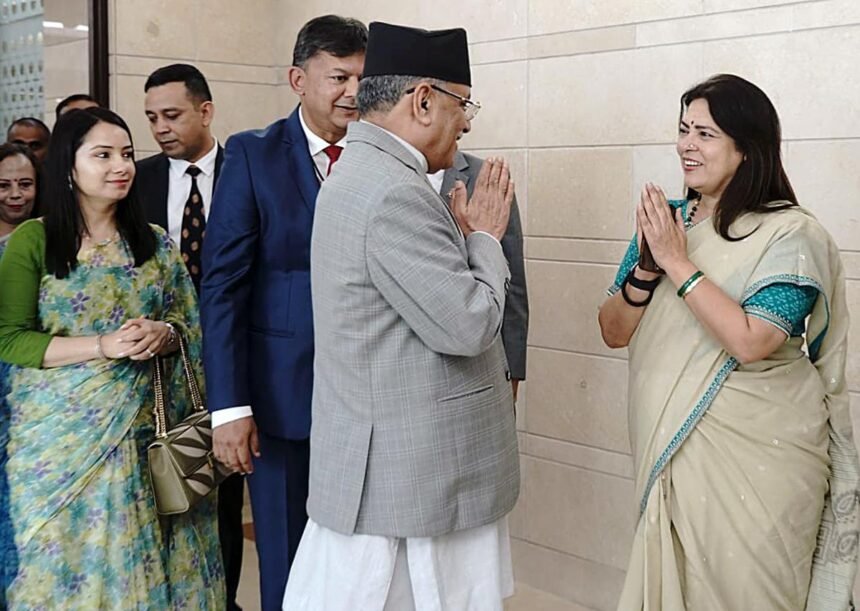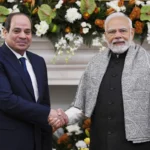Nepal’s Prime Minister, Pushpa Kamal Dahal “Prachanda,” is preparing for an official visit to Beijing in September. The announcement was made by Foreign Minister N P Saud, who stated that this visit is an attempt by the senior Maoist leader to maintain a balanced relationship with both China and India. It will be Prachanda’s second foreign trip since taking office in December the previous year, with his initial foreign visit being to India.
The 68-year-old leader of the Communist Party of Nepal-Maoist (CPN-M) is keen on strengthening ties with both China and India, the two neighboring Asian giants that have significant influence in the region. By maintaining a balanced relationship with both countries, Prachanda aims to foster economic cooperation, attract investments, and ensure Nepal’s interests are safeguarded.
Prachanda’s visit to India earlier this year was seen as a positive step in restoring bilateral relations that had faced some challenges. The trip resulted in several agreements being signed between the two countries, primarily focusing on enhancing trade, connectivity, and cooperation in various sectors. The visit demonstrated Prachanda’s commitment to maintaining friendly ties with India while seeking to diversify Nepal’s foreign relations.
Now, with the upcoming visit to China, Prachanda aims to further bolster Nepal’s relations with its northern neighbor. China has been actively involved in Nepal’s development projects, particularly in the areas of infrastructure and hydropower. Prachanda’s visit to Beijing will provide an opportunity to discuss ongoing projects, explore new avenues of cooperation, and attract Chinese investments in Nepal’s key sectors.
Nepal’s geopolitical position between China and India gives it a unique advantage to benefit from both countries’ economic growth and development. Prachanda recognizes the importance of leveraging this advantage and maintaining equilibrium in Nepal’s foreign policy. By engaging with both China and India, he seeks to harness the economic potential of both nations and create opportunities for Nepal’s socio-economic progress.
Furthermore, Prachanda’s visit to China signifies Nepal’s commitment to the Belt and Road Initiative (BRI), a massive infrastructure development project led by China. Nepal’s participation in the BRI has the potential to bring significant investments, improve connectivity, and enhance trade with other participating countries. It also aligns with Nepal’s vision of becoming a land-linked country and a bridge between South Asia and East Asia.
During his visit, Prachanda is expected to hold high-level meetings with Chinese officials and discuss a wide range of issues, including economic cooperation, infrastructure development, and regional stability. Both countries are likely to explore avenues for collaboration in areas such as trade, tourism, energy, and cultural exchanges. The visit will provide an opportunity to strengthen the existing ties and foster greater understanding between Nepal and China.
As Nepal’s Prime Minister, Prachanda is undertaking these foreign visits with the aim of diversifying Nepal’s international engagements and securing its long-term interests. By maintaining balanced relations with both China and India, he seeks to enhance Nepal’s diplomatic standing and create an environment conducive to economic growth and development.
Prachanda’s visit to China in September will undoubtedly be closely watched, not only by the people of Nepal but also by the international community. The outcomes of the visit and the subsequent collaborations between Nepal and China are expected to shape the country’s future trajectory, particularly in terms of economic development and regional cooperation.
As the Himalayan nation moves forward, Prachanda’s diplomatic efforts to strike a balance between China and India will play a crucial role in shaping Nepal’s destiny and ensuring its prosperity. The visit to Beijing marks another significant step in Nepal’s pursuit of a multi-faceted foreign policy that leverages its strategic location and builds mutually beneficial partnerships with its neighbors.




